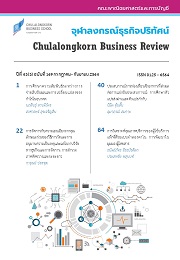Addressing Common Method Bias and Causal Inferences in Business and Management Research: Cross–Sectional versus Longitudinal Surveys
Main Article Content
Abstract
Given the prevalence of cross-sectional surveys in business and management research, journal editors and scholars have expressed concern regarding the validity of this approach. These validity concerns are often related to two main issues: common method variance (CMV) bias and causal inferences (CI). Longitudinal survey is typically recommended to address these two validity threats, but this is seldom tested empirically. Therefore, this study aims to assess the relative benefits of cross-sectional versus longitudinal data collection in terms of resolving CMV bias and enhancing CI ability. Data are collected longitudinally from 62 work groups, and the findings suggest that although longitudinal survey may provide some advantages to reducing these two validity threats, a cross-sectional survey may be appropriate in certain circumstances, such as when employing a different array of measurement formats and scales. This study’s conclusion offers a set of guidelines for researchers in deciding whether to invest in a longitudinal data collection.
Article Details
Opinions and discussions in papers published by the Creative Business and Sustainability Journal (CBSJ) are deemed as personal opinions and the responsibility of the writers. They are not the opinions or responsibility of the Chulalongkorn Business School of Chulalongkorn University.
Papers, content, information etc. appearing in the Journal are deemed to be the copyright property of the Chulalongkorn Business School of Chulalongkorn University. Anybody or any organization that wishes to publish any part of them or use them in any way must obtain written permission from the Chulalongkorn Business School, Chulalongkorn University.


